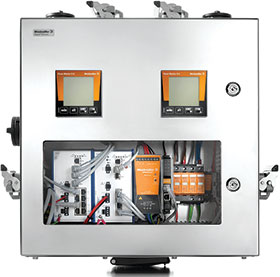

How does Belden’s communication infrastructure offering evolve to provide the capabilities needed by the the Smart Factory of the future? One example is the development of standardised infrastructure that can quickly and easily connect to modular production cells, creating very flexible manufacturing capabilities.
Flexible production is important because a large portion of the new value chains expected from the IIoT will come from the mass customisation of products. For example, imagine a beverage plant where containers can tell the equipment what liquid to fill them with and what labels to put on them.
A modular communication infrastructure box designed to work with autonomous production cells has been created by Belden in partnership with Weidmüller. Demonstrated at the Hannover Industrial Automation Fair earlier this year, it provides insight into how flexible manufacturing systems will be achieved.
Smart Factory of the Future in a nutshell
In brief, the vision of the Smart Factory evolved from an initiative of the German government called Industrie 4.0 to describe the next industrial revolution. It embraces IIoT technologies and is characterised by:
• Manufacturing that is more intelligent, flexible and dynamic than today. IoT devices will work together to deliver services (“Internet of Services”).
• Cyber-physical systems where a network of IoT devices work together to monitor or control a physical process.
• A service orientation where cyber-physical systems offer capabilities via the “Internet of Services”.
• Modularity where Smart Factories are assembled from flexible production modules connected to standardised infrastructure to meet changing requirements and capacity needs.
• Real-time collection and sharing of data to support optimisation and efficiency.
Production will be flexible and manufacturing cells and communications networks will be easily reconfigured. Eventually, instead of a production line being built to make a particular product, production modules will be rearranged and reconfigured as needed to create new lines, and each unit of production will tell the machinery and network what it wants to be.
The Belden Weidmüller Modular Infrastructure Box
In order to enable the manufacturing flexibility needed for the IIoT, Belden partnered with Weidmüller to create a Modular Infrastructure Box that provides:
• Power, Ethernet networking, standardised cabling, cyber security and lightning and surge protection.
• Status information and measurement data through built-in OPC UA communications.
• Integrated energy management.
• An industrially hardened box with ratings ranging from IP54 to IP69K.
This “plug-and-produce” infrastructure box creates a lifeline through which each manufacturing cell is supplied with everything it requires to perform its function. It facilitates fast data communications, standardised cabling and power and it ensures the safety and security of manufacturing systems. The result is efficient production processes for even the smallest of batch sizes.
Getting ready for Smart Factory today
Just like the IIoT, Smart Factory is not a destination, it’s a journey. Here are some of the activities you can be doing today to be ready for the demands of tomorrow’s flexible manufacturing world:
• Leverage IT standard technologies such as TCP/IP networking, Ethernet, and WiFi, which are adapted for use in industrial environments.
• Update your network from an ad hoc system to a well-designed industrial Ethernet infrastructure.
• Implement wireless systems and gain wireless expertise.
• Improve cybersecurity skills and measures.
• Work more closely with IT to integrate plant data into business operations.
In addition, think about the example of the Modular Infrastructure Box described in this article and how you might go about standardising your infrastructure to facilitate flexible production in the future.
Link to original article: http://tinyurl.com/zyeukoq

© Technews Publishing (Pty) Ltd | All Rights Reserved